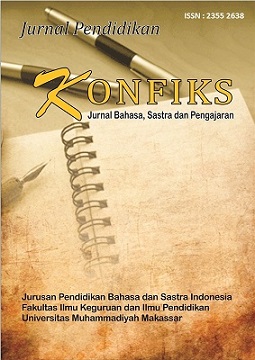DEVELOPMENT OF SELF-REGULATED LEARNING IN THE PROJECT-BASED HYBRID LEARNING MODEL TO IMPROVE SELF-REGULATED LEARNING
DOI: https://doi.org/10.26618/konfiks.v11i2.15764
Project-Based Hybrid Learning, Self-Regulated Learning, SPADA.
Abstract
In the current independent learning curriculum of the independent campus, learning in Higher Education has shifted to being based on internet digitalization. SPADA, which will be developed, is an application owned by Wijaya Putra University, which is located at spada.uwp.ac.id. The combination of project-based learning that implements hybrid learning is learning simultaneously online and offline. The problem formulation is formulated: How is the feasibility of developing a project-based hybrid learning model based on the SPADA application for student learning? How can the project-based hybrid learning model based on the SPADA application improve students' self-regulated learning abilities? This study aims To produce the feasibility of developing a project-based hybrid learning model based on the SPADA application for student learning and To explain the project-based hybrid learning model based on SPADA in improving students' self-regulated learning abilities. The research method uses an experimental approach with pretest and posttest. Based on the research results, the project-based hybrid learning model based on the SPADA application to improve the self-regulated learning abilities of Wijaya Putra University students is very effective. This is because the self-regulated learning ability for the goal-setting indicator has increased by 0.98, the environment setting indicator has increased by 0.90, the task strategy indicator has increased by 1.06, the time management indicator has increased by 1.32, the help-seeking indicator has increased by 1.81, and for the self-evaluation indicator has increased by 1.14. The implications of the findings in this study reinforce that knowledge and skills in self-regulated learning abilities are very much needed to support educational models and processes that are increasingly disrupting traditional methods by knowing the selection of digital learning resources and can encourage efforts to improve abilities in self-regulated learning abilities.
References
Al-Kamzari, F., & Alias, N. (2024). Exploring the readiness of high school physics students for project-based hybrid learning in the Sultanate of Oman. Eurasia Journal of Mathematics, Science and Technology Education, 20(2). https://doi.org/10.29333/ejmste/14241
Amiruddin, Baharuddin, F. R., Takbir, Setialaksana, W., & Nurlaela. (2023). Andragogy, Peeragogy, Heutagogy and Cybergogy Contribution on Self-Regulated Learning: A Structural Equation Model Approach. International Journal of Instruction, 16(3). https://doi.org/10.29333/iji.2023.16330a
Ardiansah, D. (2023). A Study on Project-Based Learning (PjBL) Model and English Conversational Gambits in Classroom Speaking Practices. E-Structural, 6(01). https://doi.org/10.33633/es.v6i01.7938
Astuti, N. P. E., & Sari, N. P. A. P. (2020). Jurnal basicedu. Jurnal Basicedu,. Jurnal Basicedu, 5(5). https://doi.org/https://doi.org/10.31004/basicedu.v7i6.6437
Dwijonagoro, S., & Suparno, S. (2019). PRANATACARA LEARNING: MODELING, MIND MAPPING, E-LEARNING, OR HYBRID LEARNING? Jurnal Cakrawala Pendidikan, 38(1), 156–173. https://doi.org/10.21831/cp.v38i1.23034
Frey, B. B. (2023). Wilcoxon Signed Ranks Test. In There’s a Stat for That!: What to Do & When to Do It. https://doi.org/10.4135/9781071909775.n17
Gambo, Y., & Shakir, M. Z. (2021). Review on self-regulated learning in smart learning environment. In Smart Learning Environments (Vol. 8, Issue 1). https://doi.org/10.1186/s40561-021-00157-8
Khiat, H., & Vogel, S. (2022). A self-regulated learning management system: Enhancing performance, motivation and reflection in learning. Journal of University Teaching and Learning Practice, 19(2). https://doi.org/10.53761/1.19.2.4
Martín, C., Moreno Segarra, I., Ibáñez, M. A., Mira, S., Fajardo, C., & González-Benito, M. E. (2021). Effectiveness of a Hybrid Project-Based Learning (H-PBL) Approach for Students’ Knowledge Gain and Satisfaction in a Plant Tissue Culture Course. Education Sciences, 11(7), 335. https://doi.org/10.3390/educsci11070335
Molenda, M. (2003). In search of the elusive ADDIE model. Performance Improvement, 42(5). https://doi.org/10.1002/pfi.4930420508
Priyambudi, S., & Murdani, M. H. (2020). The Development of E-Learning Model for College Students in the Industrial Era 4.0. Journal of Education and Practice, 11(31), 68–78. https://doi.org/10.7176/jep/11-31-09
Priyambudi, S., Setyowati, Y., & Probowati, Y. (2022). Pengembangan Aplikasi Virtual Class Sebagai Upaya Peningkatan Kemampuan Literasi Digital Bagi Mahasiswa STKIP Bina Insan Mandiri. Prosiding Konferensi Nasional Pengabdian Kepada Masyarakat Dan Corporate Social Responsibility (PKM-CSR), 5. https://doi.org/10.37695/pkmcsr.v5i0.1674
Suhandiah, S., Suhariadi, F., Yulianti, P., Wardani, R., & Muliatie, Y. E. (2022). Online learning satisfaction in higher education: what are the determining factors? Cakrawala Pendidikan, 41(2). https://doi.org/10.21831/cp.v41i2.35724
Supriyono, Y., Saukah, A., Latief, M. A., Widiati, U., & Suryati, N. (2020). EFL learners’ self-regulated learning in a technology-mediated language learning setting. International Journal of Innovation, Creativity and Change, 10(10).
Wityastuti, E. Z., Masrofah, S., Haqqi, T. A. F., & Salsabila, U. H. (2022). Implementasi Penggunaan Media Pembelajaran Digital di Masa Pandemi COVID-19. Jurnal Penelitian Inovatif, 2(1). https://doi.org/10.54082/jupin.39
Yakubu, M. N., & Dasuki, S. I. (2018). Assessing eLearning systems success In Nigeria: An application of the Delone And Mclean information systems success model. Journal of Information Technology Education: Research, 17. https://doi.org/10.28945/4077
Zain, D. M., & Lindinau, M. (2022). Penerapan Teknik Self-Regulated Learning dalam Pembelajaran Daring. DIDAKTIKOS: Jurnal Pendidikan Agama Kristen, 5(1). https://doi.org/10.32490/didaktik.v5i1.105
Downloads
Published
Issue
Section
License
Authors who publish with this journal agree to the following terms:
The author owns the copyright and grants the journal rights for first publication with the work simultaneously licensed under a Creative Commons Attribution License which allows others to share the work with acknowledgment of the work's authorship and initial publication in this journal.
Authors may enter into separate additional contractual agreements for the non-exclusive distribution of the published journal version of the work (for example, posting it to an institutional repository or publishing it in a book), with acknowledgment of its initial publication in this journal.
Authors are permitted and encouraged to post their work online (for example, in institutional repositories or on their websites) before and during the submission process, as this can lead to productive exchanges, as well as earlier and larger citations of published work (See The Effect of Open Access).
Statement of Authenticity and Manuscript Copyright can be downloaded: Here
After filling in the statement letter, please send via e-mail: konfiks@unismuh.ac.id





.png)


